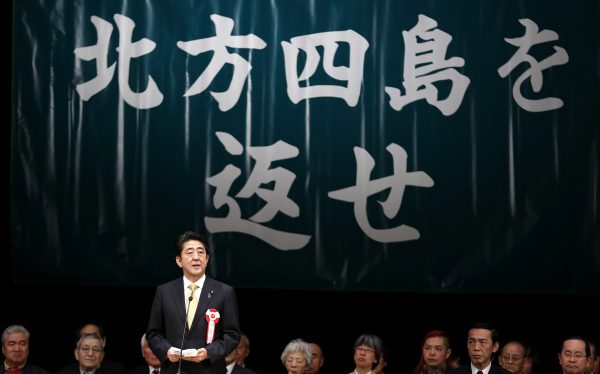Japanese Prime Minister Shinzo Abe’s personal ambitions may be contributing to this renewed push for courting Putin. Diplomatic success of any kind with Russia will give Abe and the ruling LDP an additional credit with the domestic population — something the LDP desperately needs as hopes for renewed economic growth begin to collapse.
But Japan also believes that a friendlier Russia might make a good strategic partner, even if progress on territorial issues fails to materialise. Japan is extremely worried by China’s military ambitions and by the inadequate security guarantees from the United States. Washington, they fear, would not dare start an armed conflict with China if Sino–Japanese territorial disputes over the Diaoyu/Senkaku Islands escalate. Japan must also consider a scenario where the US withdraws its nuclear ‘umbrella’ because of the ‘Trump factor’. Being ‘left alone’ against a hostile, Russian-supported China is a Japanese policymaker’s worst nightmare.
Tokyo is also concerned about the prospect of Sino–Russian rapprochement in the military field, which has emerged against the background of Moscow’s confrontation with the West. One of Japan’s national priorities should be to prevent the formation of an anti-Japanese Russian–Chinese bloc. Russia’s influence over North Korea may also be valuable for Tokyo as a hedging factor.
The Kremlin would be wise to welcome this relationship. Moscow was irritated that Beijing did not unequivocally support Russia on the Ukraine issue and refused to recognise Crimea as Russian territory. China has also tried to take advantage of Russia’s economic difficulties in an attempt to score unilateral benefits, for example, on gas prices. This push from Japan offers a welcome opportunity for Moscow to correct its ‘Chinese bias’, reduce the negative consequences of the Western sanctions regime and help promote development in the depressed territories of Siberia and the Far East.
A healthy economic cooperation package ranging from energy to medicine and including a joint investment fund, as suggested by Abe, should be of great interest to Russia in a time of lingering economic crisis. The pro-Japanese advance is also valuable as Russia seeks to broaden its Eastern policy from a purely ‘Continental’ agenda (meaning Chinese monopolisation) to a ‘Pacific’ agenda.
Territorial disputes have dominated Japan–Russia dialogues for years. The foreign ministers’ meeting on the eve of Putin’s visit in December proved that this issue will not go anywhere. Russia stresses the need to first conclude a peace treaty and then return to discussions on the Kuril Islands (referred to as the Northern Territories in Japanese) after that. This implies that the Kremlin is considering a vaguely-termed ‘joint development’ of these islands (at least some of them). The project of creating a special economic zone in the Kuril Islands may be related to this.
But any hope that a ‘cornered Russia’ might agree to a ‘grand bargain’ of giving up the islands in return for better relations and economic cooperation fails to understand Putin’s governing ideology and system. A compromise will need to be found to close these pages of history.
Now seems to be a particularly good time for a modest breakthrough because of the recent political shift in the United States. Post Trump’s victory, Washington is likely to lose its desire to intervene in Japan’s relationship with Russia. Trump has openly stressed in his campaign speeches the need to normalise relations with Moscow, and so any US attempts to torpedo Japanese advances would be illogical — especially after the Obama administration expressed its displeasure with the first Abe–Trump meeting just days after the US elections.
Trump’s rhetoric generally reflects an increased isolationist sentiment and a wish for the United States to retreat from its position as the ‘sole superpower’ and ‘global cop’. The United States’ main Asian ally should be given a freer hand in dealing with Asian affairs. Freer space for Japan to manoeuvre itself is a prerequisite to achieving this. The United States’ decreasing desire to protect its allies should allow Japan to choose its own security strategy, for which a successful relationship with Russia is essential.
Georgy Toloraya is Director of the Center for Asian Strategy at the Institute of Economy, Russian Academy of Science. Dmitry Streltsov is Head of the Department of Oriental Studies, Moscow University of International Relations (MGIMO).

